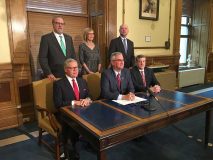Last updated on June 13th, 2024 at 11:50 am
by Terrie Ellerbee/editor-Midwest
Anyone who wanted to grab a cold beer on Sunday in Indiana was out of luck until March of this year. That is when a state law took effect allowing Sunday alcohol sales. Now a customer can get a cold one on Sunday, but only from a liquor store. Grocery, drug and convenience stores can only sell it warm.
Yes, only liquor stores can sell cold beer. Ah, Indiana.

Joe Lackey isn’t sure he will live long enough to see the state’s alcoholic beverage laws come into the 21st Century—or maybe the latter 20th Century, or to at least begin to make some sense. The president of the Indiana Grocery and Convenience Store Association told The Shelby Report that he has watched the politics of it with bafflement for years.
In February this year, Indiana Gov. Eric Holcomb signed into law a repeal of the state’s ban on Sunday carryout alcohol sales. It took effect on March 4, allowing grocery, drug, convenience and liquor stores to sell carryout alcoholic beverages on Sunday. It gives all those retailers one more day to sell alcohol, but liquor stores are unlikely to see much benefit, Lackey said.
“Once the pharmacies and the big-box boys were able to get the liquor store sales on Sunday then liquor stores had no choice but to open up,” he said. “So now they’re working seven days a week instead of six for basically the same amount of revenue.”
Liquor stores never fought for Sunday sales because they had a very comfortable monopoly on cold beer sales. The Indiana Association of Beverage Retailers (IABR), representing liquor stores, has long opposed Sunday sales. But last year, it joined with the Indiana Retail Council (IRC) to ask the state’s General Assembly to legalize Sunday alcohol sales. The IRC had long sought cold beer sales for grocery stores, so the compromise on the part of both parties may have been a surprise to some. They joined together to oppose the expansion of the sale of cold beer in the state.
It seems from the outside to be a gesture meant to keep those seeking cold beer sales in grocery, convenience and drug stores happy for a little while—at least they have an extra day to sell warm beer—and to make it appear that liquor store owners would compromise.
But it doesn’t come close to the major change Lackey and so many others would like to see. Indiana remains the only state in the union where cold beer costs more than warm beer.
“Liquor stores know that if they lose that cold beer monopoly, they’re out of business in 15 minutes,” Lackey said. “It will happen eventually. I don’t know when.”
The issue of cold beer sales was brought to light when media outlets latched onto the story of Jay Ricker. He installed seating in two of his Ricker’s convenience stores and served food. According to Indiana law at the time, that meant he could sell cold beer. The state Alcohol & Tobacco Commission granted Ricker’s the permit. Leaders in the statehouse cried foul and, urged on by the IABR, created legislation that in essence targeted Ricker’s business. As of April 2018, Ricker’s no longer can sell cold beer.
Ricker’s released a statement in March following the governor signing Sunday sales into law:
“Today’s bill signing represents a small step towards reforming Indiana’s archaic alcohol code, but it doesn’t address the number one reform demanded by Hoosiers—the ability to purchase cold beer at convenience stores. Ricker’s is proud to have played a role in highlighting the need for reform to the General Assembly, but this half-measure doesn’t represent the overhaul of our liquor laws demanded by the public. Legislators have never explained why their legislation didn’t include cold beer, but we won’t stop fighting until they end the liquor store monopoly.”
The addition of Sunday sales, Lackey said, “wasn’t what any free-enterprise, right-thinking, non-communist retailer would want, but it is closer than what it was.”
There is hope. Cold beer sales likely will be an issue in elections this year in Indiana. Lackey describes one candidate, Sen. Ron Alting, as “a big proponent of liquor stores, anti-grocer, anti-free enterprise.” The association is doing all it can to help his opposition, he said. “But the liquor stores are not to be underestimated.”

They have invested heavily to keep cold beer sales and continue to pour more money into that one issue every election cycle. The Indianapolis Star analyzed Statehouse campaign contributions from 2011 to 2016 and found that liquor stores donated $850,000; convenience stores $600,000; and big-box, grocery and pharmacy interests about $568,000 to election campaigns. Alting had received $90,000 from liquor stores since 2011, according to the newspaper. Contributions to him from big-box retailers, grocery and drug stores totaled about $4,000 and he got $3,000 from convenience stores. Alting denies that those contributions have anything to do with how he votes.
The new Sunday sales law needs a tweak and likely will be changed in the General Assembly’s next session.
“For some reason, they decided that Sunday sales should have different hours than the other six days a week (noon-8 p.m.),” Lackey said. “Nobody had a good reason why. That will be changed.”
All the laws are in fact open for reconsideration. An “Alcohol Code Revision Commission” was appointed in 2017 and began a two-year look at every law covering alcoholic beverages, from retail sales to production and distribution.
“All of them are a mess,” Lackey said. “We’ve got mayors that are screaming, saying they can’t open restaurants in their towns—high-end restaurants—because there’s no liquor license available and this is just insane and it needs to be modernized. It’s something called the free enterprise system, which is absolutely ignored under Indiana’s alcohol beverage laws.”
The commission will begin its second-year work in late summer or early fall.
“I would not be surprised to see that interim study commission come out with a recommendation to do cold beer,” Lackey said. “Because that commission got out of being controlled by the leadership last year and came out and said Sunday sales is not good enough. This whole thing needs to be rewritten. It needs to be completely redone with all of the bias taken out of it. The state needs to get out of it and stop trying to decide who’s going to make a profit from the sale of alcoholic beverages.”
Repeal the 18th
Lackey believes the trouble with the state’s alcohol laws—and in fact, those of all states—began in 1933, when the 21st Amendment to the U.S. Constitution was ratified. It repealed the 18th Amendment, which had mandated a nationwide prohibition on alcohol on Jan. 16, 1919. That was in Section 1.
Lackey said the problem is Section 2, which states, “The transportation or importation into any state, territory, or possession of the United States for delivery or use therein of intoxicating liquors, in violation of the laws thereof, is hereby prohibited.”
This has been interpreted as giving states complete control over alcoholic beverages.
“That portion of the 21st Amendment allows the states to do a lot of things that are in violation of anti-trust laws,” Lackey said. “They should never, never have been allowed.”
There have been many strange iterations over the years. Lackey remembers the days when the owner of an alcoholic beverage permit had to be of the same party as the governor of the state. When that didn’t sit well, lawmakers decided all permit holders had to be partnerships with one Republican and one Democrat.
“I mean you look at it and you think it is just unbelievable,” Lackey said. “How can they get away with that? They can get away with it because of the 21st Amendment. The problem is the 21st Amendment. The 21st Amendment has way outlived its value.”
In 1989, Indiana’s General Assembly passed a “beer baron” bill to reverse a 1979 rule banning exclusive sales territories. The governor at that time, Evan Bayh, vetoed the bill. Indiana retailers could then buy their alcoholic beverages from any wholesaler within the state, according to a Northwest Indiana Times story from Dec. 13, 1990. But the law had a sunset provision that provided for its automatic termination in 2002 if it were not taken up again by the legislature and affirmed again. It wasn’t.
When Lackey first got his start, each of Indiana’s 92 counties were the “corporate limits” for beer wholesalers. There were more than 260 beer wholesalers in Indiana.
“You have one source of supply regardless of price,” Lackey said. “Beer baron says that if you’re a retailer, you’re assigned a wholesaler that you can buy from and you cannot buy that brand from any other wholesalers. It’s the law in virtually every state. If it’s not the law, it’s under regulation.”
Keep reading:
Whole Foods Celebrates Opening Of New Downtown Indianapolis Store







You can buy hard liquor at Wal-Mart but not cold beer. But the real hook in the law is that Liquor Store chains from outside Indiana are banned from opening stores. Under the present laws Total Wine stores or any other chains are outlawed in Indiana.